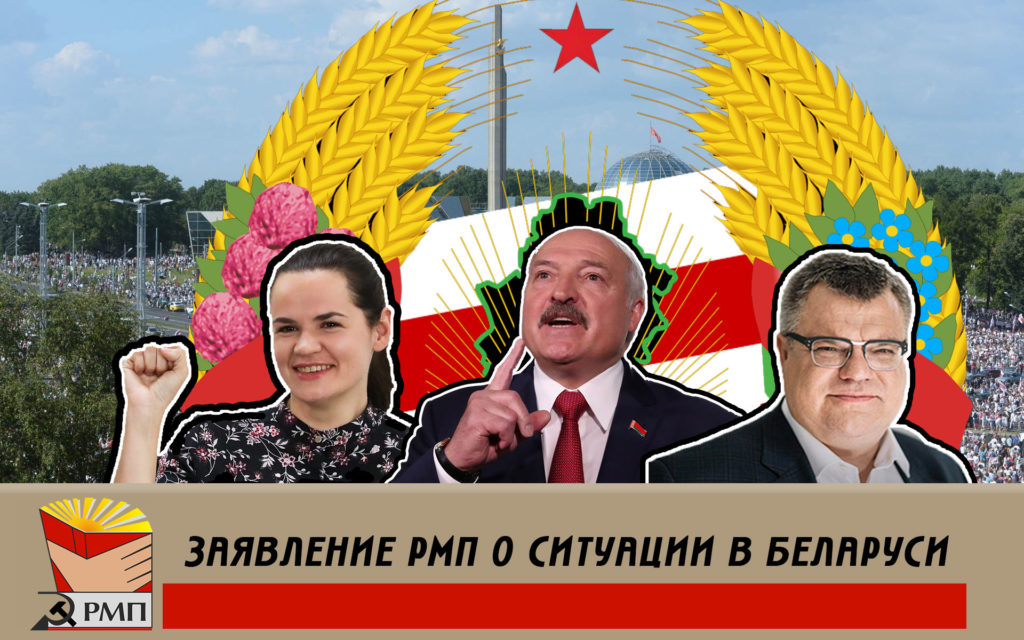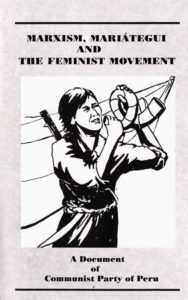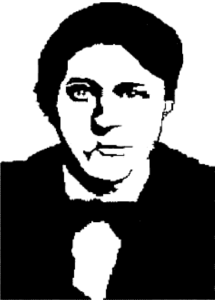“At no time since it was shown all over the country has the film ‘Inside Story of the Ching Court’ — described as patriotic though in fact a film of national betrayal — yet been criticized and repudiated.”
— Chairman Mao Tse-tung: “Letter on the Question of Studies on ‘The Dream of the Red Chamber’”
When that new day dawned over the east of the world in October 1949, the China that had been weighed down by calamities rose to its feet like a giant.
Guided by Mao Tse-tung’s thought, the Chinese people, after countless bitter struggles, finally threw off the three big mountains of imperialism, feudalism, and bureaucrat-capitalism and liberated the whole country.
The storm of the great people’s revolution was washing away the filth from the land of China. But the reactionary ruling classes, unreconciled to their doom, continued to mount frenzied, large-scale counterattacks in every field. The class struggle was very acute. On the cultural and ideological fronts it was especially complicated, and the reactionary films, plays, operas, songs, books, and journals that flooded the world of culture were important propaganda weapons in the big counterattacks carried out by the reactionary ruling classes against the revolutionary people. One of the most prominent examples was the reactionary film Inside Story of the Ching Court, which in 1950 was still being widely shown in Peking, Shanghai, and other cities.
What should be the attitude of the victorious Chinese people in face of these large-scale counterattacks by reactionary culture? Should they carry out a proletarian cultural revolution, or compromise, or surrender to the reactionary culture rampant in society? Every revolutionary comrade faced a new choice and test.
Around this reactionary film, the proletarian revolutionaries headed by Chairman Mao waged a serious struggle against a handful of Party people in authority taking the capitalist road. It was the first important struggle on the cultural and ideological fronts in liberated China.
Chairman Mao sternly pointed out: “The Inside Story of the Ching Court is a film of national betrayal and should be criticized and repudiated.” He also said: “Somebody called it patriotic; I consider it national betrayal, national betrayal through and through.” But the counterrevolutionary revisionists Lu Ting-yi and Chou Yang and a certain Hu, a standing vice director of the Propaganda Department of the Party’s Central Committee at that time, and others, as well as the top Party person in authority taking the capitalist road who was supporting them from behind, stubbornly clung to their bourgeois reactionary stand and openly opposed Chairman Mao’s directive. They asserted that this reactionary film was “patriotic” and refused to criticize and repudiate it.
Comrade Chiang Ching, then a member of a committee for guiding the work of the cinema under the Ministry of Culture, upheld the proletarian revolutionary line of Chairman Mao and at a number of meetings proposed that the film Inside Story of the Ching Court should be firmly criticized and repudiated. However, Lu Ting-yi, Chou Yang, Hu, and others vigorously opposed this proposal and did their best to advertise the “patriotic progressiveness” of this reactionary film. When Comrade Chiang Ching wanted to act according to Chairman Mao’s directive, they threw at her the reactionary talk of their boss behind the scenes, the top Party person in authority taking the capitalist road, and said: “Comrade so-and-so holds that it is a patriotic film.” Firmly upholding the truth, Comrade Chiang Ching stood her ground and in no uncertain terms refuting their reactionary and ludicrous statements insisted that the film should be criticized and repudiated. They had to give way, but perfunctorily appointed an historian of reactionary views to write a short fake criticism which was really aimed at shielding the film. They considered even such an article “too sharp,” and held up publication, thus smothering a major struggle between the proletariat and the bourgeoisie on the cultural and ideological fronts.
In 1951, Chairman Mao personally led the struggle on the cultural and ideological fronts to criticize the reactionary film The Life of Wu Hsun. In 1954, he initiated another major nationwide struggle, namely, the criticism of Yu Ping-po’s Studies on “The Dream of the Red Chamber” and the reactionary ideas of Hu Shih. On October 16 of the same year, Chairman Mao wrote a letter to the comrades in the Political Bureau of the Central Committee of the Party and other comrades concerned, sternly criticizing certain “important people” in the Party who suppressed attacks by newborn forces against the bourgeoisie and were its willing captives. In his letter, Chairman Mao again raised the question of the reactionary film Inside Story of the Ching Court. Referring to the article written by two young men criticizing Studies on “The Dream of the Red Chamber,” Chairman Mao pointed out:
This is the first serious attack in thirty years and more on the erroneous views of the so-called authoritative writer in the field of the studies of’ The Dream of the Red Chamber. The authors are two Youth League members. First they wrote to the Wen I Pao [Literary Gazette], to ask whether it was all right to criticize Yu Ping-po, but they received no reply. Ignored by the Wen I Pao, they wrote to teachers at their alma mater—Shantung University—and got their support. Their article refuting A Short Study of “The Dream of the Red Chamber” was carried in the university journal Wenshizhe /Literature, History and Philosophy/. Then the problem came back again to Peking. Some people wanted this article to be reprinted in the Renmin Ribao, to arouse discussion and criticism. This was not done because certain people opposed it, giving various reasons (mainly that it was “an article written by unimportant people” and “the Party paper is not a platform for free debates”). As a compromise, the article was allowed to be reprinted in the Wen I Pao. Later, the “Literary Legacy” page of the Kuang Ming Jih Pao carried an article by the two young men refuting Yu Ping-po’s book, Studies on “The Dream of the Red Chamber.” It seems likely that the struggle is about to start against the bourgeois idealism of the school of Hu Shih which has been poisoning young people in the field of classical literature for the last thirty years and more. This struggle has been sparked by two “unimportant people,” while the “important people,” usually taking no notice of it or even obstructing it, advocate a united front on idealism with bourgeois writers and make themselves willing captives of the bourgeoisie. It was almost the same when the films Inside Story of the Ching Court and The Life of Wu Hsun were shown. At no time since it was shown all over the country has the film Inside Story of the Ching Court— described as patriotic though in fact a film of national betrayal—yet been criticized and repudiated. The Life of Wu Hsun has been criticized, but the lessons have not yet been drawn; now comes the bizarre situation when Yu Ping-po’s idealism is tolerated and vigorous critical essays by some “unimportant people” are obstructed. This warrants our attention.
Yet class struggle is independent of man’s will. Even after Chairman Mao put the question forward so sharply, the handful of counterrevolutionary revisionists headed by Lu Ting-yi and the top Party person in authority taking the capitalist road who supported them from behind, still continued to cling to the bourgeois reactionary stand and stubbornly opposed Chairman Mao’s instructions. Twelve years have elapsed since 1954, but the Inside Story of the Ching Court, which is a reactionary, out-and-out traitorous film, remains uncriticized.
The unprecedented Great Proletarian Cultural Revolution has once again brought this question up.
Debts have to be paid sooner or later. In the present movement of the Great Proletarian Cultural Revolution, this reactionary and completely traitorous film, which has remained uncriticized since the liberation, must be subjected to thorough criticism and repudiation by the revolutionary masses. The handful of counterrevolutionary revisionists who opposed Chairman Mao’s directive and the top Party person in authority taking the capitalist road who supported them from behind, must also be thoroughly criticized and repudiated by the revolutionary masses during this movement. Accounts must be settled with them in full for their crimes of flagrantly opposing Chairman Mao’s proletarian revolutionary line and of recklessly opposing the Party and Mao Tse-tung’s thought. The revolutionary masses must overthrow this handful of counterrevolutionary revisionists, remove the top Party person in authority taking the capitalist road from his position, and make him stand aside.
The reactionary film Inside Story of the Ching Court is a film with a so-called historical theme. It deals with the Reform Movement of 1898 and the struggle of the Yi Ho Tuan [Boxer] movement in the last years of the Ching Dynasty. It openly takes the stand of imperialism, feudalism, and the reactionary bourgeoisie, freely distorts historical facts, and prettifies imperialism, feudalism, and bourgeois reformism. While eulogizing the royalists, it slanders the revolutionary mass movement and the heroic struggle of the people against imperialism and feudalism and advocates national capitulation and class capitulation.
This reactionary film was made by the Yunghua Film Company, a reactionary film studio whose first film was The Soul of a Nation. This conjured up the phantom soul of Wen Tien-hsiang to revive the soul of the dying Chiang Kai-shek regime. The Inside Story of the Ching Court was its second production. The scenario writer Yao Ke is a reactionary scribbler who holds stubbornly to the counterrevolutionary stand. He once edited the reactionary monthly Tien Hsia, opposed the Chinese revolution, and actively served British-American imperialism and the comprador-bourgeoisie. Later he went over to the Kuomintang reactionaries and wrote a series of vulgar, reactionary plays. He was a small running dog of the reactionary ruling classes. On the eve of China’s liberation, he escaped to Hongkong. There is nothing strange in a reactionary anti-communist, antipopular, literary man writing such a reactionary scenario as Inside Story of the Ching Court. But it is indeed strange that the director and certain vice directors of the Propaganda Department of the Central Committee of the Chinese Communist Party who donned the cloak of “Communists” and “proletarian revolutionaries,” and the top Party person in authority taking the capitalist road who supported them from behind, should show such favour to this extremely reactionary, thoroughly traitorous film, extol it as “patriotic,” and actively serve as spokesmen for imperialism, feudalism, and the reactionary bourgeoisie. Doesn’t this call for deep thought?
On the question of the attitude to be adopted toward this reactionary, thoroughly traitorous film, what are the major differences in principle between the proletarian revolutionaries headed by Chairman Mao on the one hand and the handful of counterrevolutionary revisionists and the top Party person in authority taking the capitalist road who supported them from behind, on the other hand? To sum up briefly, there are three differences: namely, what should be one’s attitude toward imperialist aggression; toward the Yi Ho Tuan revolutionary mass movement; and toward bourgeois reformism?
What should be one’s attitude toward imperialist aggression?
The contradiction between imperialism and the Chinese people is a principal contradiction in modern Chinese society. Imperialism is the first and most ferocious enemy of the Chinese people. What attitude should one take toward imperialist aggression is a question of first importance for the revolution.
The reactionary film Inside Story of the Ching Court, praised as “patriotic” by a handful of counterrevolutionary revisionists and the top Party person in authority taking the capitalist road who supported them from behind, is, on the question of imperialist aggression, a perfect reflection of an utterly shameful and servile attitude of fear and worship of imperialism and pro-imperialism [sic].
It reveals a mortal fear of the imperialist aggression committed by the so-called “eight-power allied expedition” organized by Britain, the United States, Germany, Russia, Japan, France, Italy, and Austria. It assiduously spreads fear of imperialism, crying that “since the Sino-Japanese War of 1894, China has suffered financial losses, her armed forces are poorly equipped and weak, . . . and she is far inferior to the enemy in strength,” that “it must not start hostilities with any foreign country.” Hsu Ching-cheng, a high-ranking mandarin, is so scared of imperialism that he wails aloud.
Chairman Mao teaches us that, before the wild beasts of imperialism, revolutionary people must not show the slightest timidity. But in the eyes of the scenarist and those who praised the film, there is no alternative but to surrender helplessly to imperialist aggression—all this is naked national capitulation, the philosophy of traitors.
Moreover, the film painstakingly advocates worship of imperialism and pro-imperialism; it goes all out to spread illusions about imperialism and openly peddles the theory of national betrayal. Through the mouth of the emperor’s concubine Chen Fei, an agent of imperialism in the film, the scenarist openly welcomes the imperialist aggression against China. Chen Fei puts it bluntly: “The foreign powers will certainly not blame Your Majesty”; “I am sure that the foreign powers will not harm Your Majesty, but on the contrary will help Your Majesty restore the throne and regenerate the imperial regime.” Sun Chia-nai, a high-ranking mandarin, also asserts: “The envoys of both the Eastern and Western Powers are sympathetic toward Your Majesty.” A comparison of this with the counterrevolutionary propaganda of the imperialists who committed aggression against China at the time, shows clearly that the film advocates just what the imperialists advocated. To deceive its people, tsarist Russia, for example, alleged that it was “not fighting against China,” “but merely putting down a riot, suppressing rebels, and helping China’s legitimate government to restore order.” In The War in China, his first article on China written as early as 1900, Lenin mercilessly refuted such counterrevolutionary arguments put forward by the aggressors.
What in fact is that “patriotism” in Inside Story of the Ching Court so extolled by the handful of counterrevolutionary revisionists and the top Party person in authority taking the capitalist road who supported them from behind? The “patriotism” they praised turns out to be the so-called “patriotism” of the Emperor Kuang Hsu and his ilk who did not hesitate to rely on imperialism to restore and consolidate their rule over the people, as is described in the film. After the Chinese people had overthrown the reactionary rule of imperialism and feudalism, they still continued to urge the people to learn the “patriotism” of becoming traitors in order to restore and consolidate the exploiting classes’ rule over the people. Such is their vicious intention!
Chairman Mao teaches us: “The specific content of patriotism is determined by historical conditions. There is the ‘patriotism’ of the Japanese aggressors and of Hitler, and there is our patriotism. Communists must resolutely oppose the ‘patriotism’ of the Japanese aggressors and of Hitler.” Likewise, we must resolutely oppose the so-called “patriotism” (namely, an out-and-out theory of national betrayal) advocated by a handful of counterrevolutionary revisionists and the top Party person in authority taking the capitalist road.
The traitorous argument about welcoming imperialism to help China “regenerate the imperial regime” advocated by the film is of the same stock as the gangster logic of U.S. imperialism. Singing the same tune as those imperialists did when they carried out aggression against China, ex-U.S. Secretary of State Acheson in his 1949 White Paper talked at length about U.S. “concern” for China and described aggression as “friendship.” In “Cast Away Illusions, Prepare for Struggle,” “‘Friendship’ or Aggression?” and other articles, Chairman Mao had already sternly rebutted such counterrevolutionary gangster logic. He pointed out that it is “the logic of the U.S. mandarins” to describe aggression as “friendship.” Yet a handful of counterrevolutionary revisionists and the top Party person in authority taking the capitalist road who supported them from behind, yielded to imperialist pressure and were mortally afraid of imperialism. They vainly hoped to arrange a compromise with imperialism, and get “understanding” and “help” from it. They were deeply dissatisfied with Chairman Mao’s great call “cast away illusions, prepare for struggle.” That they energetically boosted this reactionary, out-and-out traitorous film Inside Story of the Ching Court was in fact in open opposition to Chairman Mao’s criticism and repudiation of Acheson’s White Paper. This was an unbridled attack on Mao Tse-tung’s thought.
Obviously, the reason why this reactionary film company and reactionary scribbler made such a film on the eve of China’s liberation, a film that advocates imperialist “help” in “regenerating the imperial regime,” was that they wanted to use their film to arouse public opinion for their own reactionary purposes and openly advocate reliance on U.S. imperialism to suppress the revolutionary movement of the Chinese people, a stratagem they proposed to the Kuomintang reactionaries who were on their last legs. The film entirely takes the stand of imperialism and the Kuomintang reactionaries. It represents an attempt to help prop up the toppling reactionary regime to meet the needs of U.S. imperialist aggression against China and to serve U.S. imperialism and its lackeys. The handful of counterrevolutionary revisionists who paid lip-service to “opposing imperialism,” and the top Party person in authority taking the capitalist road who supported them from behind, eulogized such a reactionary, out-and-out traitorous film and called it “patriotic.” Doesn’t this expose their true features as sham anti-imperialists and genuine capitulationists? What country do they love? What they love is a country belonging to the imperialists, a country belonging to the landlords and the bourgeoisie, but not our great motherland under the dictatorship of the proletariat. The “patriotism” they eulogize is nothing but a theory of national betrayal which all the revolutionary people of our country want to trample underfoot.
One thing in particular needs to be pointed out. It is by no means accidental that the top Party person in authority taking the capitalist road should have praised a reactionary, out-and-out traitorous film as “patriotic.” As early as the first days of the victory of the War of Resistance Against Japan, he was frightened when faced with aggression by U.S. imperialism and its lackeys. Despairing of the future of the Chinese revolution, he actively promoted within the Party a line of national capitulation and class capitulation in what he described as a “new stage of peace and democracy.” Chairman Mao called on us to cast away illusions, to give the enemy tit for tat and fight for every inch of land, whereas this person energetically spread illusions about peace with U.S. imperialism and its lackeys and impudently wrote articles in newspapers in which he expressed gratitude for U.S. imperialist “help” to China and begged for “peace” from U.S. imperialism in an attempt to benumb the fighting will of the people. He even deceived the people by saying that “the main form of struggle in the Chinese revolution has become peaceful and parliamentary. It is legal mass struggle and parliamentary struggle,” “there should be a change in the whole of the Party’s work,” and “all political issues should be settled peacefully.” Chairman Mao said that as our enemies were sharpening their swords, we must sharpen ours too. Yet this person wanted the people to hand over the weapons in their hands. Energetically advertising the theory of national betrayal, he took the enemy as his father and wanted to be a willing servant of U.S. imperialism. He said: “Since the U.S. is bound to find compradors in China, we, too, may act as its compradors, red compradors!” Compradors are compradors. They are running dogs of the imperialists. What’s this about “red compradors”? It is a pure lie. With such a mean and shameless slave mentality, long ago eager to be imperialist compradors, they found the reactionary, out-and-out traitorous film Inside Story of the Ching Court extremely well suited to their taste. This was because the theory advocated by Chen Fei, the imperialist agent in the film, that imperialism might help China “regenerate the imperial regime” exactly reflected their traitorous mentality of eagerly wanting to become compradors of imperialism!
“Hearts which have a common beat are linked.” This is a line of verse the Emperor Kuang Hsu reads out in the film while looking dejectedly at a lake. This is an apt description of the fact that the handful of counterrevolutionary revisionists and the top Party person in authority taking the capitalist road shared the feelings of Kuang Hsu, his concubine, and their ilk. On the question of serving as imperialist agents, the handful of counterrevolutionary revisionists and the top Party person in authority taking the capitalist road who supported them from behind echoed the views of the landlords and the bourgeoisie of over 60 years ago. This is the ideological and class root of their praise for the “patriotism” of this reactionary, out-and-out traitorous film.
What should be one’s attitude toward the Yiho Tuan revolutionary mass movement?
Chairman Mao says: “In the final analysis, the innumerable truths of Marxism may be expressed in one sentence: ‘rebellion is justified.’” What should be one’s attitude toward the revolutionary movement of all-out rebellion against imperialism and feudalism launched by the revolutionary masses of the Yi Ho Tuan? Should one support it or oppose it? Should one praise it or hate it? This is a touchstone distinguishing genuine revolutionaries from fake, revolutionaries from counterrevolutionaries.
The Yi Ho Tuan movement which shook our vast land was a great anti-imperialist, anti-feudal revolutionary mass movement in modern Chinese history. It was a great movement typifying the initiative of the Chinese people in history. At that time, the Yi Ho Tuan carried on revolutionary activities everywhere, in town and countryside, throughout most of the northern part of China. They set up more than 800 meeting places in the city of Peking itself, the political centre where the enemy exercised the tightest rule. Youths who had joined the Yi Ho Tuan drilled regularly every day under the palace walls behind Ching Shan.
At a crucial moment when our country was in process of being partitioned amongst the imperialists, the Yi Ho Tuan heroes stepped forth bravely, raised aloft the great revolutionary banner of patriotic struggle against imperialism, and carried on a heroic struggle against the imperialist robbers and their lackeys. They splashed the street corners with slogans of every description which gave expression to the firm resolve of the Chinese people to fight the imperialists:
Restore to us our land and rights! We’ll fight our way
Through seas of fire and over mountains of knives!
What does it matter if the Emperor has surrendered?
We’ll not rest till the last foreign invader is dead.
They held the imperialists in contempt; they strictly banned imported goods. The street bearing the name “Legation Street” they renamed “Block the Aliens Street” and the Yu Ho Bridge: “Stop the Aliens Bridge.” Demonstrating in the streets, the Yi Ho Tuan heroes often shouted the slogan “Kill the foreign devils!” in unison with the inhabitants, making the imperialists shudder. Some foreigners were so frightened that they put themselves into coffins and hired professional mourners to carry them out of the city.
In June 1900, Yi Ho Tuan revolutionary activities reached a climax. Day and night, in groups of 30, 40, or SO, the Yi Ho Tuan detachments from Peking’s outlying districts marched on the city. Scores arrived each day. The guards at the city gates stood at attention to salute them and shouted to the crowds to make way. Long columns of the revolutionary people in red turbans, red sashes, and shoes trimmed in red, armed with swords and spears, marched with great dignity in grand parades through the streets of Peking city. And the blacksmiths outside Chienmen worked through the night before their blazing furnaces making swords and spears for the Yi Ho Tuan.
Faced with the frenzied repression of the imperialist aggressor forces, the revolutionary masses of the Yi Ho Tuan pitted their primitive swords and spears heroically against the invaders armed with modern rifles and guns. They demonstrated the Chinese people’s militant, revolutionary spirit of fearlessness. In the famous battle at the railway town of Langfang to halt the enemy’s advance on Peking, the Yi Ho Tuan “blockaded in the train and heavily challenged with spears” an allied force of more than 1,500 men led by British Admiral Seymour. The enemy suffered casualties amounting to nearly 50 percent of his strength, and beat a panicky retreat to Tientsin. Later Seymour recalled his fright that had the “Boxers” been armed with western weapons, the allied force he led would have been annihilated. In the battle to defend Tientsin, the Yi Ho Tuan fought the aggressors’ army hand-to-hand. At the railway station, in one engagement alone they killed or wounded more than 500 men of an, opposing Russian aggressor force of 2,000. The imperialists were forced to admit that there had not been anything like the way the Chinese fought the western soldiers in the bitter battle at Tientsin which went on tenaciously for over a month. In the battle at Yangchun, the American imperialist aggressor army was mercilessly trounced by the Yi Ho Tuan fighters. From then on, the imperialist aggressor armies shuddered at the very bugle note of the Yi Ho Tuan. They wailed: “Those long brass trumpets that can make one’s blood curdle horribly. . . .”
Young people formed a most active and lively force during the Yi Ho Tuan movement. They performed immortal deeds in this great revolutionary movement. The Hung Teng Chao (Red Lanterns) that shook China and the world was an organization of young women from many places in northern China. They formed themselves into a well-disciplined force, did military exercises, and defended their homeland. They were dressed in red, wore red caps, carried red lanterns and red spears. They fought at the front and ferreted out spies in the rear. Playing an active part in the Yi Ho Tuan ranks and resolutely opposing imperialism and its lackeys, they displayed the heroic, anti-imperialist, anti-feudal revolutionary spirit of China’s young women.
“The Hung Teng Chao (Red Lanterns), and the Yi Ho Tuan are like real brothers and sisters. They are united as one, and as one they fight the foreign officials.” This ditty expressed the resolute determination of the Hung Teng Chao to fight the imperialists.
Tales of the heroic deeds of the Hung Teng Chao have circulated widely among the masses of the people ever since. One saying was: “Those Hung Teng girls stare death fearlessly in the face when they charge the enemy positions. Their only worry is that they may lag behind in the fighting.” Another comment was: “Since the reigns of Taokuang and Hsienfeng all the battles at sea and on the land in coastal China against the alien invaders ended in defeat” but “now these girls are giving the foreigners such a trouncing that their victories have struck terror into the hearts of those foreign countries, and stirred the spirits of the Chinese people.”
The heroic struggle of the Yi Ho Tuan is the glory and pride of the Chinese people and one of the foundation stones of the great victory of the Chinese people fifty years later. It gave the aggressors a taste of the iron fists of the Chinese people and smashed the imperialists’ pipe dream of “partitioning” China. Waldersee, commander of the invading imperialist army, reported to the German kaiser: “Your Majesty may entertain the idea of partitioning China, but let it not be forgotten . . . there is still immense vitality in them. The Chinese have not lost all their bellicosity, which may be seen in the recent ‘Boxer Movement.’ Whether Europe or America or Japan, he said, no country is intellectually or militarily equipped for the job of ruling over this one-quarter of mankind. It is therefore an ill-advised policy to try dismemberment.
Real Marxists have always enthusiastically praised revolutionary mass movements of such a tremendous scale. In his great works, Chairman Mao highly appraises the Yi Ho Tuan movement and extols its heroic deeds again and again. He regards the Yi Ho Tuan movement as an important stage in the development of China’s bourgeois democratic revolution. Chairman Mao has pointed out: The Yi Ho Tuan war was a just war against the oppressors. Like other revolutionary wars of the Chinese people in the last hundred years, it “testifies to the Chinese people’s indomitable spirit infighting imperialism and its lackeys.” It shows that “we Chinese have the spirit to fight the enemy to the last drop of our blood, the determination to recover our lost territory by our own efforts, and the ability to stand on our own feet in the family of nations.” “Thanks to the Chinese people’s unrelenting and heroic struggle during the last hundred years, imperialism has not been able to subjugate China, nor will it ever be able to do so.”
But the reactionary and thoroughly traitorous film Inside Story of the Ching Court, praised by a handful of counterrevolutionary revisionists and the top Party person in authority taking the capitalist road supporting them from behind, expresses a deep-rooted class hatred for the anti-imperialist revolutionary mass movement of the Yi Ho Tuan, and does its best to defame and slander it. The film portrays the revolutionary action of the Yi Ho Tuan against imperialism as a sort of barbarous turmoil. It tries its utmost to smear the Yi Ho Tuan, maliciously attacking it as “mad,” “mobs” who “committed murder and arson,” and as “ignorant people” who engaged in “witchcraft.”
These malicious slanders uttered against the Yi Ho Tuan by the film and those who praised it are completely in tune with the views of the imperialists. At that time Dean Acheson, a chieftain of U.S. imperialism, cursed the Yi Ho Tuan movement in his White Paper as “the anti-foreign disturbances in China” and “the Boxer Rebellion.” The hired intellectuals of U.S. imperialism in China were also unbridled in their attacks against the Yi Ho Tuan movement as an “offspring of ignorant superstition and hysterics of the mob,” as a “perpetrator of senseless acts,” and as “Boxers” who committed murder and arson.
Was it the Yi Ho Tuan organized by the Chinese people that went to the imperialist countries in Europe and America and to Japan to stage rebellion and “commit murder and arson”? Or was it the imperialist countries that came to invade China, this land of ours, to oppress and exploit the Chinese people and so aroused the masses of the Chinese people to resist imperialism and its lackeys and corrupt officials in China? This is a major question of right and wrong which must be debated and cleared up.
The real bandits who massacred people and committed arson were none other than the imperialists and their lackeys. According to the admissions of Alfred von Waldersee, head of the invading imperialist troops, these troops, after occupying Peking, burnt, massacred, plundered, raped, destroyed cultural treasures, and committed all manner of crimes. Following their occupation of Peking, the imperialist troops were granted special permission to loot openly for three days. This was followed by robbery on an individual basis. They plundered everywhere, from the imperial court and mansions of the princes to the homes of ordinary people. “The windows facing the lakeside were widely opened; court officials were alarmed to see a line of camels coming.” The historical relics stored in the Summer Palace, a treasure house of the feudal emperors, were carried away by the aggressors to Tientsin by camels, and this took many a month. Many relics preserved for centuries in China, including the Yung Lo Encyclopedia, were burnt or stolen by the imperialists. Waldersee also confessed that there were many cases of rape, brutality, willful murder, and senseless arson in the course of plunder. As for the massacre and suppression of the Yi Ho Tuan by the imperialists’ lackeys, it was even more brutal and callous.
With deep indignation, Lenin condemned the crimes of massacre and arson committed by the imperialist aggressors. He wrote:
The European governments (the Russian Government among the very first) have already started to partition China. . . . They began to rob China as ghouls rob corpses, and when the seeming corpse attempted to resist, they flung themselves upon it like savage beasts, burning down whole villages, shooting, bayoneting and drowning in the Amur River [Heilungkiang River] unarmed inhabitants, their wives, and their children. And all these Christian exploits are accompanied by howls against the Chinese barbarians who dared to raise their hands against the civilized Europeans.
But the film and those who praised it have turned things upside down and assisted the evil doers, portraying the imperialist aggressors who committed murder, arson, robbery, and rape as envoys of civilization while slandering as “barbarous rioters” the heroic and indomitable Yi Ho Tuan who resolutely resisted imperialist aggression. This is the genuine philosophy of quislings and traitors.
The patriotic, anti-imperialist struggle of the Yi Ho Tuan was closely linked with the anti-feudal struggle. The battle cries of the Yi Ho Tuan were: “Kill the foreigners and wipe out corrupt officials.” A ditty of the time runs as follows: “Slay the foreigners and kill the beastly mandarins; great hopes will shine before the common people when the foreigners and mandarins are gone.” “First kill the foreign devils and then beat up the corrupt officials.” Such were their simple and forthright anti-imperialist and anti-feudal revolutionary slogans. They deeply hated the feudal ruling class. In 1900 when the Yi Ho Tuan controlled Peking, most of the offices of the mandarins of the Ching Dynasty in the capital and the mansions of princes, dukes, and aristocrats were watched over by members of the Yi Ho Tuan. The Yi Ho Tuan on many occasions caught officials who were notorious for their crimes, especially those subservient to imperialism, and forced them to kowtow and repent at the altar set up by the Yi Ho Tuan. Those who had committed the most heinous crimes were put to death.
Yet the film slanders the Yi Ho Tuan as a tool of the feudal rulers. The film portrayed Chao Shu-chiao, a high-ranking mandarin of the Ching Dynasty, as one who had said: “The Empress Tzu Hsi [the Empress Dowager] is begged to issue an order to organize the Yi Ho Tuan into an imperial army.” The empress gladly accepted this suggestion. In this way the Yi Ho Tuan was made out to be partisans of the Empress Tzu Hsi. This is an utterly vicious slander.
For a short period, the rulers of the Ching Dynasty adopted the policy of deceiving and softening up the Yi Ho Tuan. For a time, this policy had some effect and some members of the Yi Ho Tuan were misled into an erroneous understanding of the rulers of the Ching Dynasty. Some detachments of the Yi Ho Tuan put forward the slogan “Support the Ching Dynasty and wipe out the foreigners.” This reflects, on the one hand, the complicated nature of the class contradictions at that time and, on the other hand, the fact that people’s understanding of imperialism and its lackeys at that time remained at the stage of perceptual knowledge.
Chairman Mao has taught us that man’s knowledge develops from the lower to the higher stage and from perceptual knowledge to rational knowledge. “Similarly with the Chinese people’s knowledge of imperialism. The first stage was one of superficial, perceptual knowledge, as shown in the indiscriminate anti-foreign struggles of the movement of the Taiping Heavenly Kingdom, the Yi Ho Tuan movement, and so on. It was only in the second stage that the Chinese people reached the stage of rational knowledge, saw the internal and external contradictions of imperialism, and saw the essential truth that imperialism had allied itself with China’s comprador and feudal classes to oppress and exploit the great masses of the Chinese people. This knowledge began about the time of the May 4th Movement of 1919.” Therefore it is absolutely impermissible to slander the Yi Ho Tuan movement as a tool of the feudal rulers only because it failed to see clearly the nature of imperialism and feudalism. As stated above, along with their anti-imperialist activities, the Yi Ho Tuan never for a moment ceased their activities against the Ching Dynasty. Even after the appearance of the slogan “Support the Ching Dynasty and wipe out the foreigners,” Chu Hung-teng [Red Lantern Chu], leader of the Yi Ho Tuan, worked out a plan for an attack on Peking and persevered in the anti-feudal struggle.
It was solely to meet the needs of imperialism and the feudal landlord class that the reactionary film the Inside Story of the Ching Court so unscrupulously slandered and attacked the anti-imperialist, anti-feudal struggle of the Yi Ho Tuan movement. Their slanders and attacks against the revolutionary masses of the Yi Ho Tuan movement reflect the bitter hatred of the class enemy for the peasants—the main force of the Chinese revolution—and the bitter hatred of the class enemy for the new democratic revolutionary movement led by our Party. The handful of counterrevolutionary revisionists and the top Party person in authority taking the capitalist road who was supporting them from behind were singing the same tune as imperialism and feudalism when they applauded this reactionary, thoroughly traitorous film which opposes the Chinese revolution and insults the revolutionary masses. When they did this they were simply serving as mouthpieces for the counterrevolutionary propaganda of imperialism and feudalism. This has completely exposed their counterrevolutionary class stand which is that of the landlords and bourgeoisie.
The fact that the top Party person in authority taking the capitalist road so bitterly hates the revolutionary mass movements in history helps us to understand better why, in the current Great Proletarian Cultural Revolution, he put forward, in collaboration with another top Party person in authority taking the capitalist road, a bourgeois reactionary line in a vain attempt to extinguish the revolutionary flames set alight by Chairman Mao himself, why he confused right and wrong and turned things upside down, organized converging attacks against revolutionaries, suppressed the masses and carried out a white terror, and why he tried in a hundred and one ways to boost the arrogance of the bourgeoisie and crush the spirit of the proletariat.
What should be one’s attitude toward bourgeois reformism?
One’s attitude toward bourgeois reformism is, in reality, a question of one’s attitude toward the socialist road and the capitalist road.
With regard to this fundamental question which concerns the future of the Chinese revolution, differences of principle have long existed between the proletarian revolutionaries headed by Chairman Mao and the Party people in authority taking the capitalist road. These differences of principle became even more acute after China was liberated. The question of what attitude should one take toward the reactionary film the Inside Story of the Ching Court was a point at which these differences came to a head. This was the first fight at close quarters in the struggle between the proletariat and the bourgeoisie and between the socialist road and the capitalist road on the cultural and ideological fronts. In this fight, in their evaluations of the film, the proletarian revolutionaries headed by Chairman Mao, on the one hand, and the handful of Party people in authority taking the capitalist road, on the other, gave completely different answers to the question of which direction should China take.
A handful of counterrevolutionary revisionists and the top Party person in authority taking the capitalist road, who was supporting them from behind, did their best to boost this reactionary film which opposes revolution and sings the praises of reformism. They aimed to get help from the dead souls of bourgeois reformism and using the latter’s names, robes, and slogans to spread capitalism in China.
The Reform Movement of 1898 which the film glorifies was a reformist movement of the Chinese bourgeoisie. This movement was launched by certain members of the feudal ruling class and a number of bourgeois reformers who were starting to break away from the feudal ruling class. They launched this movement under the threat of a revolutionary storm and the disaster of national subjugation and in the interests of the landlords and the bourgeoisie. This was an attempt to lead China onto the road of capitalism through reformist modernization and constitutional reform from above.
Under the historical conditions of the time, the 1898 Reform Movement was, to some extent, a blow against the ideological domination of the feudal ruling class and it played a certain enlightening role in the process of ideological emancipation. We have always taken note of this point. However, such recognition means making a critical assessment of historical personages and incidents from the viewpoint of historical materialism. It does not in any way mean an unprincipled glorifying of the 1898 Reform Movement and its representative participants. The representative persons of the 1898 Reform Movement were themselves rulers who exploited and oppressed the working people. Their reformist goal did not and could never serve the interests of the people’s revolution; they aimed at consolidating their rule and exploiting the people even more effectively.
What they wanted to change was not the essence but only some minor aspects of the old order. The illusion they cherished was simply the gradual transformation by devious means of the landlord economy into a semi-landlord and semi-capitalist economy (actually a semi-feudal and semi-colonial economy). This was an attempt to head off the people’s revolutionary movement and suppress the revolution in unapparent ways. Even at that time, therefore, reformism could never be the way out for the Chinese people.
At the end of the nineteenth century, there already existed two roads of social reform in China: one was the bourgeois reformist road which meant the attempt to get to capitalism by means of constitutional reform and modernization from above. In the historical conditions of China at that time, this could not be other than a false, impassable, and reactionary road because China lacked the historical conditions for reformist modernization such as existed in western Europe and Japan. China was then being gradually reduced to a semi-feudal and semi-colonial state under imperialist aggression. Yet Kang Yu-wei and Liang Chi-chao, leaders of the Chinese bourgeois reformists, placed their hopes for constitutional reform and modernization precisely on imperialism. They cherished the illusion that they could go over completely to the side of imperialism and rely on its strength to realize their aims of constitutional reform and modernization. The result of that could only be to bring a wolf into the house and accelerate the process of reducing China to a semi-colonial, semi-feudal state, in which the development of capitalism in China would be absolutely out of the question. The other road of social reform was for the broad masses to rise up and make revolution by armed struggle. Both the Taiping Revolution and the Yi Ho Tuan movement took this road. These revolutions did not achieve final victory because they lacked proletarian leadership. However, they dealt heavy blows at imperialism and feudalism and promoted China’s historical advance.
“I raise my sword to laugh at the sky.” A most tragic and moving episode of the 1898 Reform Movement was the death of Tan Szu-tung, a courageous and enlightening thinker. His death announced the premature end of this movement and the bankruptcy of the bourgeois reformist road. Half a century later, however, the reactionary film Inside Story of the Ching Court again advocated bourgeois reformism, which had long ago gone bankrupt. This film does its utmost to spread the nonsensical idea that “if China is to become rich and strong, there must be constitutional reform and modernization!” Through the mouth of the Emperor Kuang Hsu, the film gives high praise to constitutional reform and modernization, extravagantly lauding reformism in such words as “Meiji reforms,” “the imperial decree on constitutional reform,” and “if China continues to reform in this way, in less than 30 years it will become the richest and most powerful state in the world!” This is a crazy call for a bourgeois republic, for western bourgeois civilization and for the bourgeois reformist road, which will never be tolerated by the revolutionary people!
The film lauds to the skies the representative persons of bourgeois reformism, the Emperor Kuang Hsu in particular. It says that the emperor “wearied his brain and suffered much vexation. . . in the interests of the state and the people,” and pictures him as saying “as long as Quotations from Chairman Mao Tse-tung Eng. ed., Peking: Foreign Languages Press, 1966, p. 118.the affairs of state are going well. . . personal health is of little account.”
Especially vicious is the way that the film, while singing the praises of emperors, kings, ministers, and generals and prettifying bourgeois reformism, tries by every means to smear the working people and vilify the masses as a “mob.” Toward the end of the film, the scenarist, through distorted and slanderous images of peasants and village women, extravagantly glorifies the Emperor Kuang Hsu, praising him as a “good emperor,” “helping us, the people,” and saying that “we all think of His Majesty!” The villagers “offer” eggs and other refreshments to the Emperor Kuang Hsu. On his departure, the film shows “the people kneeling along the roadside to see him off.” The film gives currency to the slander that “the masses are most obedient and most easily satisfied.” Are the masses of people really such easygoing, obedient, base, and ugly mobs? It is absolutely impermissible to smear the working people! Chairman Mao teaches us: “The people, and the people alone, are the motive force in the making of world history.” That the handful of counterrevolutionary revisionists and the top Party person in authority taking the capitalist road, who supports them from behind, have done so much to sing the praises of this reactionary film which glorifies emperors and kings, ministers and generals, smears the working people, and preaches bourgeois reformism only serves to expose their true colours of all-out opposition to Marxism-Leninism, Mao Tse-tung’s thought.
The Chinese people won revolutionary victory through protracted armed struggle under the leadership of Chairman Mao, and on the eve of the founding of the People’s Republic of China, Chairman Mao himself summed up the revolutionary struggles of the past 100 years, criticizing and repudiating the bourgeois reformist road and proclaiming that “western bourgeois civilization, bourgeois democracy, and the plan for a bourgeois republic have all gone bankrupt in the eyes of the Chinese people.” What angers people especially is the fact that after all this the handful of counterrevolutionary revisionists and the top Party person in authority taking the capitalist road should have described this reactionary, out-and-out traitorous film, which sings the praises of bourgeois reformism and advocates the capitalist road, as a “patriotic” film and put it on show in a big way in every part of China without criticism and repudiation. If this can be tolerated, what cannot be tolerated?
In his article, “On the People’s Democratic Dictatorship,” Chairman Mao states: “From the time of China’s defeat in the Opium War of 1840, Chinese progressives went through untold hardships in their quest for truth from the Western countries.” Chinese who then sought progress maintained that “only modernization could save China, only learning from foreign countries could modernize China.” “The Japanese had been successful in learning from the West, and the Chinese also wished to learn from the Japanese.” But, “imperialist aggression shattered the fond dreams of the Chinese about learning from the West. It was very odd—why were the teachers always committing aggression against their pupil? The Chinese learned a good deal from the West, but they could not make it work and were never able to realize their ideals.” “The salvoes of the October Revolution brought us Marxism-Leninism.” “Under the leadership of the Communist Party of China, the Chinese people, after driving out Japanese imperialism, waged the People’s War of Liberation for three years and have basically won victory.” “Bourgeois democracy has given way to people’s democracy under the leadership of the working class and the bourgeois republic to the people’s republic. This has made it possible to achieve socialism and communism through the people’s republic, to abolish classes, and enter a world of Great Harmony. Kang Yu-wei wrote Ta Tung Shu, or the Book of Great Harmony, but he did not and could not find the way to achieve Great Harmony. There are bourgeois republics in foreign lands, but China cannot have a bourgeois republic because she is a country suffering under imperialist oppression. The only way is through a people’s republic led by the working class.”
A handful of counterrevolutionary revisionists and the top Party person in authority taking the capitalist road disregarded the historical facts as well as the warnings given by Chairman Mao. They continued to use the reactionary and out-and-out traitorous film, Inside Story of the Ching Court, to prettify western bourgeois civilization, prettify bourgeois democracy, prettify the bourgeois republic, and advocate bourgeois reformism and the capitalist road. This amounts to flagrantly opposing Mao Tse-tung’s thought and vainly attempting a restoration of capitalism in China. They put all their efforts into extolling the reactionary film, Inside Story of the Ching Court, precisely because this film, which opposes revolution and eulogizes reform, serves to beat the gongs and clear the way for them to stage a capitalist restoration. What they did was in effect to use people of former times to sing the praises of capitalism and the road of bourgeois reformism, to use this film to mislead the masses and prettify bourgeois reformism, their ultimate purpose being to overthrow the people’s regime, undermine our dictatorship of the proletariat, and place the fruits of the victory of the revolution in the hands of the bourgeoisie.
The serious struggle that developed around the reactionary film, Inside Story of the Ching Court, is by no means merely a question of one film, but a struggle between the two classes, the bourgeoisie and the proletariat, a struggle between Marxism-Leninism, Mao Tse-tung’s thought on the one hand, and bourgeois reformist and revisionist ideas on the other, a struggle between an attempt at capitalist restoration and the efforts of the proletariat opposed to capitalist restoration. In the final analysis, it is a struggle to determine who will win, capitalism or socialism.
Under the leadership of their great leader Chairman Mao, the Chinese people fought hard, bloody battles, advanced wave upon wave, and finally carried the struggle against imperialism and feudalism to victory. With the whole country liberated, where should liberated China go? To whom should the fruits of victory belong? Which class was entitled to pick the peaches that had grown, watered by the blood and lives of thousands upon thousands of revolutionary martyrs? Such major questions were the focus of the struggle waged between various classes in Chinese society not only at that time; they remain so even today.
The bourgeoisie wanted to snatch the fruits of victory from out of the hands of the people. They wanted to pick the peaches. They wanted China, just liberated, to take the capitalist road. The top Party person in authority taking the capitalist road was the one to pick the peaches on behalf of the bourgeoisie.
Since liberation, the top Party person in authority taking the capitalist road has gone on dreaming night and day of capitalist restoration, obstinately clinging to his bourgeois world outlook, zealously yearning for bourgeois reformism, and trying his utmost to stop the Chinese revolution halfway, thus giving a big boost to capitalism.
Chairman Mao has said that the founding of the People’s Republic of China on October 1, 1949, marked the basic completion of the stage of new democratic revolution and the beginning of the stage of socialist revolution. The top Party person in authority taking the capitalist road, however, harped on a contrary tune, painstakingly preached “consolidation of the new democratic order,” and campaigned for the development of capitalism in China.
Before and after the showing throughout the country of the reactionary film, Inside Story of the Ching Court, he campaigned everywhere, making many sinister speeches, issuing many sinister directives, energetically praising the so-called “progress” and “glory” of the capitalist system, and spreading the absurd idea that “exploitation is no crime,” “to rebel is not justified.” Marx said: “Capital comes [into the world] dripping from head to foot, from every pore, with blood and dirt.” But, the top Party person in authority taking the capitalist road had this to say: “In China, there is not too much capitalism, but too little”; “It is necessary to develop capitalist exploitation for such exploitation is progressive”; “Instead of being an evil, capitalist exploitation today is a contribution.” He loudly stated that “the working people do not oppose exploitation, but welcome it”; and that “the more the capitalists, the more the exploitation, the more satisfaction we will have.” He even shamelessly told a number of capitalists that “the agony of the workers is unemployment. What they fear is that no one will exploit them. Therefore, they feel it better to be exploited than not.” “The workers want you to exploit them. If you do not exploit them, they will be miserable.” “The capitalists are also serving the people.” “If you are able to exploit more, you will be benefiting both the state and the people.” “The more you exploit, the greater will be your merit and glory.” “Exploitation by the capitalists has its merits in history and such merits are immortal.” He energetically spread the idea that “exploitation is legal,” saying: “It is legal to make [a] profit, however great it may be. “It is also legal to indulge in beautiful clothes, rouge and powder and wining and dining.” Talking like a clown, he addressed capitalists: “Messrs. capitalists! I beg you to exploit me! If you exploit me, I shall be able to feed myself and my wife and children will be able to live. If you do not exploit me, that will be terrible.”
When the workers did not accept his stinking reactionary theories, he slandered them as “lacking political understanding and having a low level of political consciousness.” Speaking like an accomplice of the capitalists, he maliciously threatened the workers: “If the workers are unruly, it is legal (for the capitalists) to struggle against (them).”
At the same time, he also vigorously advocated the development of capitalist economy in the rural areas, clamouring for “long-term protection of the rich-peasant economy,” advancing the “four freedoms” (freedom of usury, of hiring labour, land sale, and private enterprise). He advocated vigorous efforts to foster the type of peasant “who owns three horses, a plough, and a cart” so as to develop the rich-peasant economy. He talked such nonsense as: “At present, exploitation saves people and it is dogmatic to forbid exploitation. Now there must be exploitation and it should be welcomed. If the refugees from south of the Great Wall who go to northeast China are exploited by the rich peasants there, these refugees will be very grateful for such exploitation.” “Hiring hands is not exploitation; it increases the wealth of society.” He also proposed that there should be “no limitation” on hiring hands to till the land. “It is legal to hire hands to till the land; this benefits the masses too.” He claimed that “those who exploit can also be socialists” and that “there is nothing to be afraid of, should there be 10,000 rich-peasant Party members in northeast China.” He tried to get the capitalist economy to swiftly flood the rural areas.
In singing the praises of the man-eating capitalist system of exploitation, not even the hired scholars of the bourgeoisie and the motley crew of apologists for old and modern revisionism could catch up with this top Party person in authority taking the capitalist road.
Each plant yields its own particular fruit; each class speaks in its own terms. The top Party person in authority taking the capitalist road thinks and loves capitalism and talks capitalism too. The cannibal philosophy that he peddles serves entirely to develop capitalism and safeguard the bloody system of exploitation of man by man. His voice is the voice of vampires and parasites. This thoroughly exposes his filthy, ugly bourgeois soul.
In trying to justify himself, the top Party person in authority taking the capitalist road said that his case was one of “a veteran revolutionary meeting new problems.”
What a “veteran revolutionary meeting new problems”!
Could there be a “veteran revolutionary” so frantically carrying out activities to restore capitalism?
Could there be a “veteran revolutionary” who would so wildly oppose our great leader Chairman Mao and the great thought of Mao Tse-tung?
If he really is a “veteran revolutionary,” then let him explain:
Why is it that, on the eve of the outbreak of the War of Resistance Against Japan, you preached so vigorously the philosophy of survival, a capitulationist philosophy, a traitor’s philosophy, and directed some people to make confessions and surrender to the Kuomintang and betray the Communist Party, openly publish “anti-communist statements” and vow “firmly to oppose communism”?
Why is it that, after the victory of the War of Resistance, you advanced the capitulationist line of “a new stage of peace and democracy”?
Why is it that, after liberation, you did your utmost to oppose the socialist transformation of capitalist industry and commerce, oppose agricultural cooperation, and slash the number of agricultural cooperatives?
Why is it that, after the completion of the transformation of capitalist industry and commerce, agriculture and handicrafts, you painstakingly propagated the dying out of class struggle and actively advocated class collaboration and the liquidation of class struggle?
Why is it that, during the three difficult years, you echoed the ghosts and monsters at home and abroad in viciously attacking the three red banners [the Party’s general line for building socialism, the great leap forward, and the people’s communes], while advocating the revisionist line of “the extension of plots for private use and of free markets, the increase of small enterprises with sole responsibility for their own profits or losses, the fixing of output quotas based on the household,” and “the liquidation of struggle in our relations with imperialism, the reactionaries, and modern revisionism, and reduction of assistance and support to the revolutionary struggle of other peoples”?
Why is it that you republished in 1962 that poisonous weed, that deceitful book on self-cultivation of Communists which does not advocate revolution, class struggle, the seizure of political power, and the dictatorship of the proletariat, which opposes Marxism-Leninism, Mao Tse-tung’s thought, preaches a decadent bourgeois world outlook and the reactionary philosophy of bourgeois idealism?
Why is it that in the socialist education movement you put forward and pushed through the opportunist line which was “Left” in form but Right in essence to sabotage the socialist education movement?
Why is it that in the course of the Great Proletarian Cultural Revolution you have colluded with another top Party person in authority taking the capitalist road in putting forward and carrying out the bourgeois reactionary line?
There is only one answer: You are not at all a “veteran revolutionary”! You are a sham revolutionary, a counterrevolutionary. You are a Khrushchev lying right beside us!
During the past seventeen years, a handful of counterrevolutionary revisionists, with the support of the top Party person in authority taking the capitalist road, has launched a frenzied, all-round attack on the proletariat, spreading a great deal of poison in the fields of politics, economy, culture, and education.
In this Great Proletarian Cultural Revolution, we must follow Chairman Mao’s teachings, organize a mighty cultural army of the proletarian revolution, thoroughly smash the frenzied attacks by this handful of counterrevolutionary revisionists and the top Party person in authority taking the capitalist road, dig out the main root of revisionism in our country, overthrow careerists and conspirators like Khrushchev, prevent such bad elements from usurping the leadership of the Party and the state, and guard against the restoration of capitalism, so as to guarantee that our country will never change its colour!
“With power and to spare we must pursue the tottering foe.” This Great Proletarian Cultural Revolution initiated and led by our great leader Chairman Mao himself is aimed precisely at mobilizing the hundreds of millions of people to pursue relentlessly the handful of counterrevolutionary revisionists and the top Party person in authority taking the capitalist road who supports them from behind, to recapture all the citadels they usurped and ensure that Mao Tse-tung’s thought occupy all positions. It is precisely as Comrade Lin Piao said in speaking about this Great Proletarian Cultural Revolution: “It is a big campaign; it is a general attack on the ideas of the bourgeoisie and all other exploiting classes.” We must respond to the great call of Chairman Mao to hold high the revolutionary banner of criticism and repudiation, plunge bravely into the struggle, thoroughly criticize, repudiate, and eliminate in all fields the noxious influences of the bourgeois reactionary line represented by the top Party person in authority taking the capitalist road, we must vigorously destroy the old ideas of the exploiting classes and establish the complete ascendancy of Mao Tse-tung’s thought.
The road of struggle is tortuous and its development is uneven. There is resistance along the road of advance. We must overcome all difficulties, break down all resistance and carry the Great Proletarian Cultural Revolution through to the end; we must not give up halfway.
Unfurl the red banner of the great and invincible thought of Mao Tse-tung all over China; may it shine for ever in splendour!
Long live the victory of the movement of the Great Proletarian Cultural Revolution led personally by our respected and beloved leader Chairman Mao!
Примечания
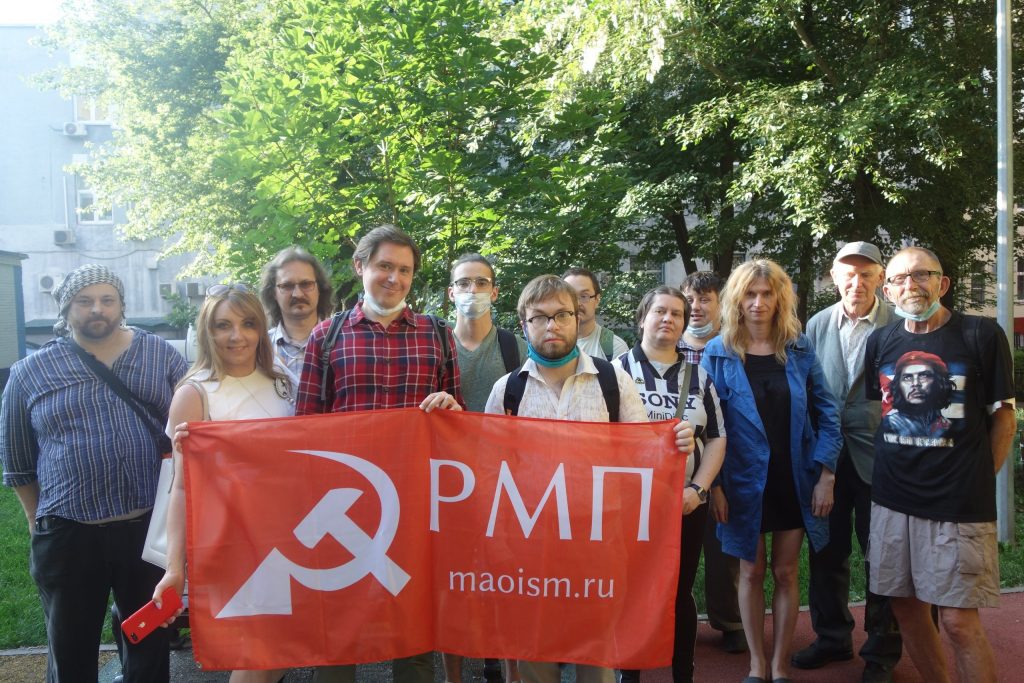
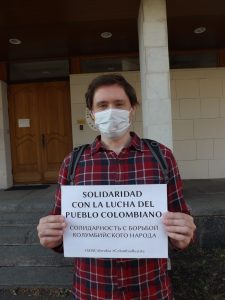
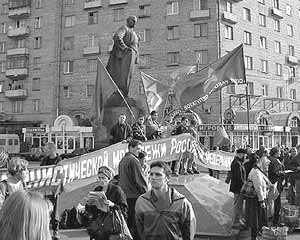 It’s a quiet night here, by Shchukinskaya metro station. If you look out the window, you can see the twin towers of the swanky Aliye Parusa apartment complex, painted a really eerie shade of turquoise, looming in the distance. In fact, they look so uncannily like a downsized copy of the Twin Towers of 9/11 fame that one wonders why the Chechen guerrillas don’t hijack some kukuruznik (a pathetic-looking little plane used for spraying fertilizer and pesticides on fields) somewhere in the wilds of Ichkeria and reenact here in Moscow the valorous deed of their co-religionists in NYC. Would look very hip and postmodern—plus, with any luck, the wreck and ruin caused by such an explosion would stop just short of the borders of the neighborhood I live in, taking away the worthless lives of the rich scum who can afford an apartment in Aliye Parusa and leaving righteous cheapo revolutionaries like myself—and the proletarians and oppressed masses living in my filthy ghettolike neighborhood—unscathed and rejoicing.
It’s a quiet night here, by Shchukinskaya metro station. If you look out the window, you can see the twin towers of the swanky Aliye Parusa apartment complex, painted a really eerie shade of turquoise, looming in the distance. In fact, they look so uncannily like a downsized copy of the Twin Towers of 9/11 fame that one wonders why the Chechen guerrillas don’t hijack some kukuruznik (a pathetic-looking little plane used for spraying fertilizer and pesticides on fields) somewhere in the wilds of Ichkeria and reenact here in Moscow the valorous deed of their co-religionists in NYC. Would look very hip and postmodern—plus, with any luck, the wreck and ruin caused by such an explosion would stop just short of the borders of the neighborhood I live in, taking away the worthless lives of the rich scum who can afford an apartment in Aliye Parusa and leaving righteous cheapo revolutionaries like myself—and the proletarians and oppressed masses living in my filthy ghettolike neighborhood—unscathed and rejoicing.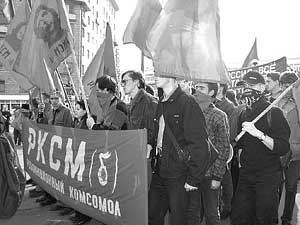 That’s the official story, culled from various news agencies. How much of it is true, I don’t know and I don’t care to know. Throwing bombs or hurling jet planes at symbols of authority sucks as a method of overthrowing the Shitstem, only making it nastier and more virulent—but, then again, there is the righteous wrath of the oppressed and the downtrodden and the plain damn losers and no Marxist wiseacres like me or my friends can do shit to hold it back. Working out your existential neuroses (I’ve heard of a lady terrorist who was initially drawn into the Struggle by—I’m not kidding—her ignorance of the joys of masturbation) by posing as the new Charlie-Manson-cum-Red-Brigades is pathetic—but it’s surely better and worthier of a human being than the mindless routine of a pseudo-Westernized cog in the wheel of the Society of the Spectacle, who earns just as little below the salary of a garbageman in LA as to be able to look down upon 99.999 per cent of his compatriots and whose only joys in life are waking up Saturday mornings with a condom on his cock and a strange body in his bed plus his masochistic hatred of the Chechen Terrorists. And, for all I know, there might have been no bomb, no terrorist plot, no nothing. Our charming powers that be are more than capable of framing whomever they like for whatever they’ve got a mind to. You, gentle reader, may one day find yourself accused of being an operative of the CIA or, say, the security services of the Republic of Trinidad and Tobago. The girl that you pick up at the Hungry Duck or wherever you filthy foreigners flush with ill-gotten bucks seduce our naïve and trusting girls, leaving no chance to us cheapo Russians, and that you wake up together with the next morning with a condom on your cock, may, if she is a physics or engineering major, be accused of industrial espionage for Western intelligence agencies. And if she reads Chomsky or Marx, she may be framed for a bombing case like the one described above. It’s all a fucking lottery. But more of that later.
That’s the official story, culled from various news agencies. How much of it is true, I don’t know and I don’t care to know. Throwing bombs or hurling jet planes at symbols of authority sucks as a method of overthrowing the Shitstem, only making it nastier and more virulent—but, then again, there is the righteous wrath of the oppressed and the downtrodden and the plain damn losers and no Marxist wiseacres like me or my friends can do shit to hold it back. Working out your existential neuroses (I’ve heard of a lady terrorist who was initially drawn into the Struggle by—I’m not kidding—her ignorance of the joys of masturbation) by posing as the new Charlie-Manson-cum-Red-Brigades is pathetic—but it’s surely better and worthier of a human being than the mindless routine of a pseudo-Westernized cog in the wheel of the Society of the Spectacle, who earns just as little below the salary of a garbageman in LA as to be able to look down upon 99.999 per cent of his compatriots and whose only joys in life are waking up Saturday mornings with a condom on his cock and a strange body in his bed plus his masochistic hatred of the Chechen Terrorists. And, for all I know, there might have been no bomb, no terrorist plot, no nothing. Our charming powers that be are more than capable of framing whomever they like for whatever they’ve got a mind to. You, gentle reader, may one day find yourself accused of being an operative of the CIA or, say, the security services of the Republic of Trinidad and Tobago. The girl that you pick up at the Hungry Duck or wherever you filthy foreigners flush with ill-gotten bucks seduce our naïve and trusting girls, leaving no chance to us cheapo Russians, and that you wake up together with the next morning with a condom on your cock, may, if she is a physics or engineering major, be accused of industrial espionage for Western intelligence agencies. And if she reads Chomsky or Marx, she may be framed for a bombing case like the one described above. It’s all a fucking lottery. But more of that later.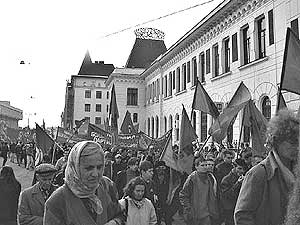 Much later in the evening, at party with some friends, Dennis stopped dead in the middle of an argument, exclaimed: “Communism is not Communism!”, puked into my plate and passed out.
Much later in the evening, at party with some friends, Dennis stopped dead in the middle of an argument, exclaimed: “Communism is not Communism!”, puked into my plate and passed out. Neither the AKM nor its parent organization, the Trudovaya Rossiya (“Labor Russia”), popularly known as the “Anpilov babushkas,” are really about Communism. Nor are they about fascism, anarchism, antiglobalism or Soviet patriotism, though each of these ideologies does play a part. What these two groups are really all about is a totally nonthinking and visceral reaction of bewildered people to a hostile environment. In the microbiological world, if you drip some acid into a test tube filled with a solution with amoebas and infusoria in it, the critters will naturally drift to the section least affected by the acid. In the animal kingdom, you have the familiar Russian aphorism: “Flip the horse on the nose, it will wag its tail.” In the Russian political world, you have the Trudovaya Rossiya and the AKM.
Neither the AKM nor its parent organization, the Trudovaya Rossiya (“Labor Russia”), popularly known as the “Anpilov babushkas,” are really about Communism. Nor are they about fascism, anarchism, antiglobalism or Soviet patriotism, though each of these ideologies does play a part. What these two groups are really all about is a totally nonthinking and visceral reaction of bewildered people to a hostile environment. In the microbiological world, if you drip some acid into a test tube filled with a solution with amoebas and infusoria in it, the critters will naturally drift to the section least affected by the acid. In the animal kingdom, you have the familiar Russian aphorism: “Flip the horse on the nose, it will wag its tail.” In the Russian political world, you have the Trudovaya Rossiya and the AKM.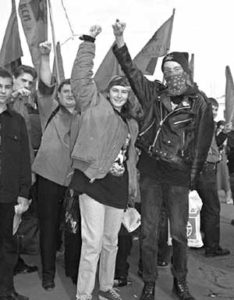
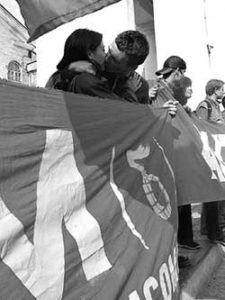
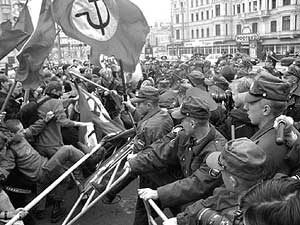 If I go on for much longer (and if the long-suffering eXile editors decide to publish my piece), I’m afraid I’ll exhaust the paper’s none-too-plentiful royalties fund with these endless thousands upon thousands of words. So let’s wind up with some conclusions and the aftermath of the events.
If I go on for much longer (and if the long-suffering eXile editors decide to publish my piece), I’m afraid I’ll exhaust the paper’s none-too-plentiful royalties fund with these endless thousands upon thousands of words. So let’s wind up with some conclusions and the aftermath of the events.